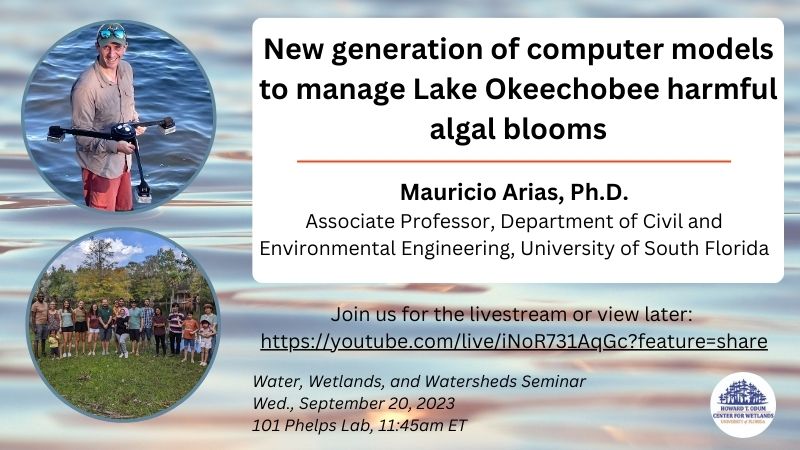
Mauricio Arias, Associate Professor, Department of Civil and Environmental Engineering, University of South Florida
Join us for the livestream September 20th, 11:45am ET: https://youtube.com/live/01opwAz2W7Y?feature=share.
(Please visit our YouTube channel main page for the stream if there are any issues with the direct link.)
ABSTRACT
Harmful algal blooms (HABs), often exacerbated by excess nutrients from anthropogenic activities, are a growing problem for many lakes around the world. In southcentral Florida (USA), Lake Okeechobee, with a surface area of 1,730 km2 is the largest subtropical lake in the United States. The lake is shallow, nutrient-rich, and subject to frequent and intense blooms of cyanobacteria, some of which are toxic and have caused ecological, health and economic disruptions in the lake and coastal waters that receive discharges from the lake via canals. In this presentation, I will talk about recent findings we have from two complementary computer models we have recently developed: the Lake Okeechobee Delft3d model, and the Lake Okeechobee Optimization of Nutrients Exports. Results from these models have shown, for instance, that reducing both nitrogen and phosphorus inputs by 50-75% would be more effective at reducing HABs in the lake than targeting a single nutrient. Also, results show that proper optimization of water releases into the main distributaries of the lake (the St. Lucie and Caloosahatchee estuaries), which could decrease P exports by 12-33%. Our current research is focusing on combining simulations with artificial intelligence algorithms to improve prediction accuracy. We are also expanding the applicability of these models in terms of outputs (e.g., nitrates and cyanobacteria), short-term forecasting capabilities, and a graphical user interphase to better engage with federal and state agencies.
BIO
I am an Associate Professor in the Department of Civil and Environmental Engineering at the University of South Florida (Tampa), where I am the Principal Investigator of the Watershed Sustainability Lab (https://www.watershedsustainability.org) and teach undergraduate and graduate courses in water resources. Areas of current research include surface water quantity/quality prediction and Ecological Engineering, with emphasis on tropical and subtropical watersheds. I came to USF in 2016 after completing a Post-doctoral research fellowship in the Sustainability Science Program at Harvard University. I hold a Bachelor of Science (Magna Cum Laude) and a Masters of Engineering in Environmental Engineering Sciences from the University of Florida, and a PhD in Civil Engineering from the University of Canterbury (New Zealand). I have published 63 peer-reviewed articles in top scientific journals including Science, Nature Sustainability, Proceedings of the National Academy of Sciences, Water Resources Research, and Journal of Hydrology. I have been the PI or Co-PI in 14 funded research projects for a total of US$6,8 million, and I have been the senior mentor of 18 graduate students. In 2021, I became a Gulf Research Program Early Career Fellow by the National Academy of Sciences, and more recently, I received USF’s Outstanding Research Achievement Awards.
POSTCARD
